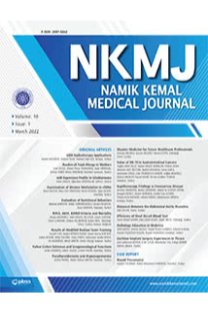Sağlık Bilimleri Fakültesi Öğrencilerinin Psikobiyotik Özellik Gösteren Besinlerin Tüketim Durumları ile Mutluluk Düzeyleri Arasındaki İlişki
probiyotikler, psikobiyotik besinler, Oxford Mutluluk Ölçeği
The Relationship Between Consumption Status and Happiness of Psychobiotic Foods of Faculty of Health Sciences Students
probiotics, psychobiotic foods, Oxford Happiness Scale,
___
- 1. Veenhoven R. Happiness: Also Known as “Life Satisfaction” and “Subjective Well-Being”. 2012. p. 63-77.
- 2. Guerra-Bustamante J, León-Del-Barco B, Yuste-Tosina R, López-Ramos VM, Mendo-Lázaro S. Emotional Intelligence and Psychological Well-Being in Adolescents. Int J Environ Res Public Health. 2019;16(10):1720.
- 3. Lesani A, Mohammadpoorasl A, Javadi M, Ansari H, Fakhari A. Happiness Among College Students: A Cross-Sectional Web-Based Study Among Iranian Medical Students. Biotechnology and Health Sciences. 2016;In Press.
- 4. Owen L, Corfe B. The role of diet and nutrition on mental health and wellbeing. The Proceedings of the Nutrition Society. 2017;76(4):425-6.
- 5. Lim SY, Kim EJ, Kim A, Lee HJ, Choi HJ, Yang SJ. Nutritional Factors Affecting Mental Health. Clin Nutr Res. 2016;5(3):143-52.
- 6. Dinan TG, Stanton C, Cryan JF. Psychobiotics: a novel class of psychotropic. Biological psychiatry. 2013;74(10):720-6.
- 7. Kopp-Hoolihan L. Prophylactic and therapeutic uses of probiotics: a review. Journal of the American Dietetic Association. 2001;101(2):229-38; quiz 39-41.
- 8. Sarkar A, Lehto SM, Harty S, Dinan TG, Cryan JF, Burnet PWJ. Psychobiotics and the Manipulation of Bacteria-Gut-Brain Signals. Trends in neurosciences. 2016;39(11):763-81.
- 9. Clarke G, Stilling RM, Kennedy PJ, Stanton C, Cryan JF, Dinan TG. Minireview: Gut microbiota: the neglected endocrine organ. Molecular endocrinology (Baltimore, Md). 2014;28(8):1221-38.
- 10. Bermudez-Humaran LG, Salinas E, Ortiz GG, Ramirez-Jirano LJ, Morales JA, Bitzer-Quintero OK. From Probiotics to Psychobiotics: Live Beneficial Bacteria Which Act on the Brain-Gut Axis. Nutrients. 2019;11(4).
- 11. Marotta A, Sarno E, Del Casale A, Pane M, Mogna L, Amoruso A, et al. Effects of Probiotics on Cognitive Reactivity, Mood, and Sleep Quality. Frontiers in psychiatry. 2019;10:164.
- 12. Misra S, Mohanty D. Psychobiotics: A new approach for treating mental illness? Critical reviews in food science and nutrition. 2019;59(8):1230-6.
- 13. Foster JA, McVey Neufeld KA. Gut-brain axis: how the microbiome influences anxiety and depression. Trends in neurosciences. 2013;36(5):305-12.
- 14. Chi L, Khan I, Lin Z, Zhang J, Lee MYS, Leong W, et al. Fructo-oligosaccharides from Morinda officinalis remodeled gut microbiota and alleviated depression features in a stress rat model. Phytomedicine : international journal of phytotherapy and phytopharmacology. 2019;67:153157.
- 15. Karakula-Juchnowicz H, Rog J, Juchnowicz D, Loniewski I, Skonieczna-Zydecka K, Krukow P, et al. The study evaluating the effect of probiotic supplementation on the mental status, inflammation, and intestinal barrier in major depressive disorder patients using gluten-free or gluten-containing diet (SANGUT study): a 12-week, randomized, double-blind, and placebo-controlled clinical study protocol. Nutrition journal. 2019;18(1):50.
- 16. Pekcan GJDEK. Beslenme durumunun saptanmasi. 2008:67-141.
- 17. Khosrojerdi Z, Tagharrobi Z, Sooki Z, Sharifi K. Predictors of happiness among Iranian nurses. International journal of nursing sciences. 2018;5(3):281-6.
- 18. Doğan T, Sapmaz FJDAPvNBD. Oxford mutluluk ölçeği Türkçe formunun psikometrik özelliklerinin üniversite öğrencilerinde incelenmesi. 2012;25(4):297-304.
- 19. Marshall AL, Smith BJ, Bauman AE, Kaur S. Reliability and validity of a brief physical activity assessment for use by family doctors. British journal of sports medicine. 2005;39(5):294-7; discussion -7.
- 20. Bahrami S, Rajaeepour S, Rizi HA, Zahmatkesh M, Nematolahi Z. The relationship between students' study habits, happiness and depression. Iranian journal of nursing and midwifery research. 2011;16(3):217-21.
- 21. Kim HK, Kim SH, Jang CS, Kim SI, Kweon CO, Kim BW, et al. The combined effects of yogurt and exercise in healthy adults: Implications for biomarkers of depression and cardiovascular diseases. Food science & nutrition. 2018;6(7):1968-74.
- 22. Marotta A, Sarno E, Del Casale A, Pane M, Mogna L, Amoruso A, et al. Effects of Probiotics on Cognitive Reactivity, Mood, and Sleep Quality. 2019;10(164).
- 23. Kim CS, Shin DM. Probiotic food consumption is associated with lower severity and prevalence of depression: A nationwide cross-sectional study. Nutrition (Burbank, Los Angeles County, Calif). 2019;63-64:169-74.
- 24. Mohammadi AA, Jazayeri S, Khosravi-Darani K, Solati Z, Mohammadpour N, Asemi Z, et al. The effects of probiotics on mental health and hypothalamic-pituitary-adrenal axis: A randomized, double-blind, placebo-controlled trial in petrochemical workers. Nutritional neuroscience. 2016;19(9):387-95.
- 25. Macht M, Dettmer D. Everyday mood and emotions after eating a chocolate bar or an apple. Appetite. 2006;46:332-6.
- 26. Zare A, Khaksar Z, Sobhani Z, Amini M. Analgesic Effect of Valerian Root and Turnip Extracts. World J Plast Surg. 2018;7(3):345-50.
- 27. Darwish M, Osman N, Mfs F, Yonies BJBPS. Turnip (Brassica Rapa L.) Attenuate Liver and Kidney Damage Induced by Gamma Irradiation in Rats. 2016;2:28-33.
- ISSN: 2587-0262
- Yayın Aralığı: 4
- Başlangıç: 2013
- Yayıncı: Galenos Yayınevi
Nukleus akumbens bölgesine uygulanan topiramatın morfin yoksunluk sendromu üzerine etkileri
Songül ÖZKULA, Oya Helin DUNDAR, Selcuk EROL, Ramazan BAKAR, Heja GECİT, N. Eymen TURAN, M. Fırat BALIK, Hasan YANANLI, Rezzan GÜLHAN, Mahluga JAFAROVA DEMİRKAPU
KANSER HASTALARINDA UYKU KALİTESİNİ ETKİLEYEN FAKTÖRLER
Nilay ŞENGÜL SAMANCI, Emir CELİK, Ezgi DEGERLİ, Melih KASAP, Kerem ORUC, Sahin BEDİR, Sumeyra DERİN, Nihan SENTURK, Burc POYRAZ, Zeynep TURNA, Fuat DEMİRELLİ
Türkiye’de Yaşa Bağlı Maküla Dejenerasyonunda Endikasyon Dışı İlaç Kullanımı
Hanife RAHMANLAR, Cemile ÜÇGÜL ATILGAN, Mehmet ÇITIRIK, Ali ALKAN, Hakkı GÜRSÖZ
Ayça TÜRER CABBAR, Mehmet EREN
ERİTROSİT DAĞILIM GENİŞLİĞİ: MİGREN İLİŞKİLİ BEYİN MRG LEZYONLARI İÇİN YENİ BİR BELİRTEÇ Mİ?
Tekirdağ Bölgesi Dermatomikoz Hastalarının Klinik, Demografik ve Laboratuvar Sonuçları
Hülya ALBAYRAK, Mine AYDIN, Onur RAİMOĞLU, Mehmet YANIK, Aynur EREN
Retrospective Evaluation of Placenta Previa Cases: A Secondary-center Experince
Mehmet OBUT, Süleyman Cemil OĞLAK
Servikal serklaj uygulamasının gebeliğin devamındaki başarısının değerlendirilmesi
Otizm Spektrum Bozukluğunun nedenlerine ait ebeveyn algısının tedavi tercihine etkisi
Miraç Barış USTA, Ayşegül DUMAN KURT, Hatice GÜLŞEN, Koray KARABEKİROĞLU
Meltem ÖZNUR, Murat AKGÜL, Ayşegül İSAL ARSLAN, Cenk Murat YAZICI, Enes ALTIN
